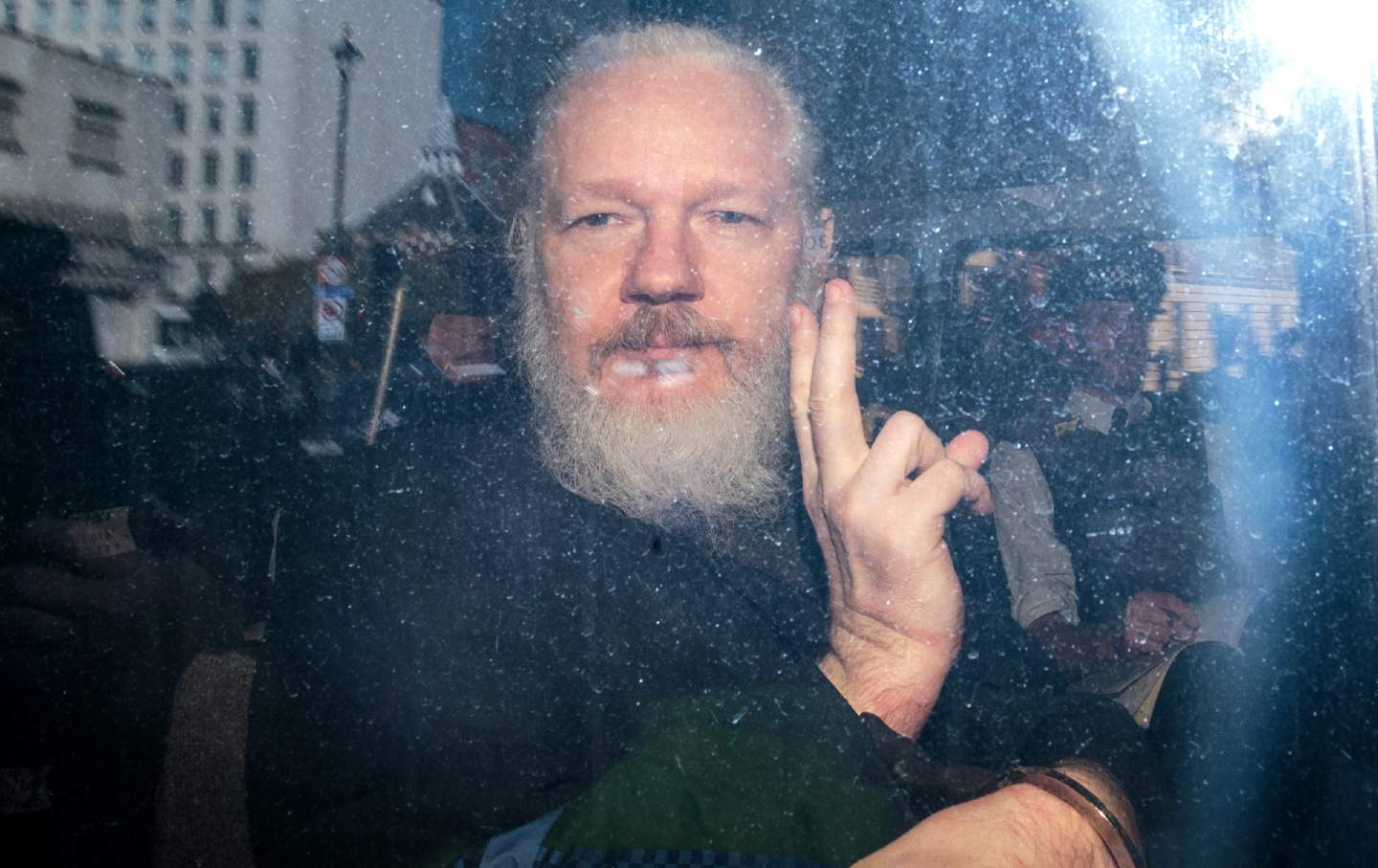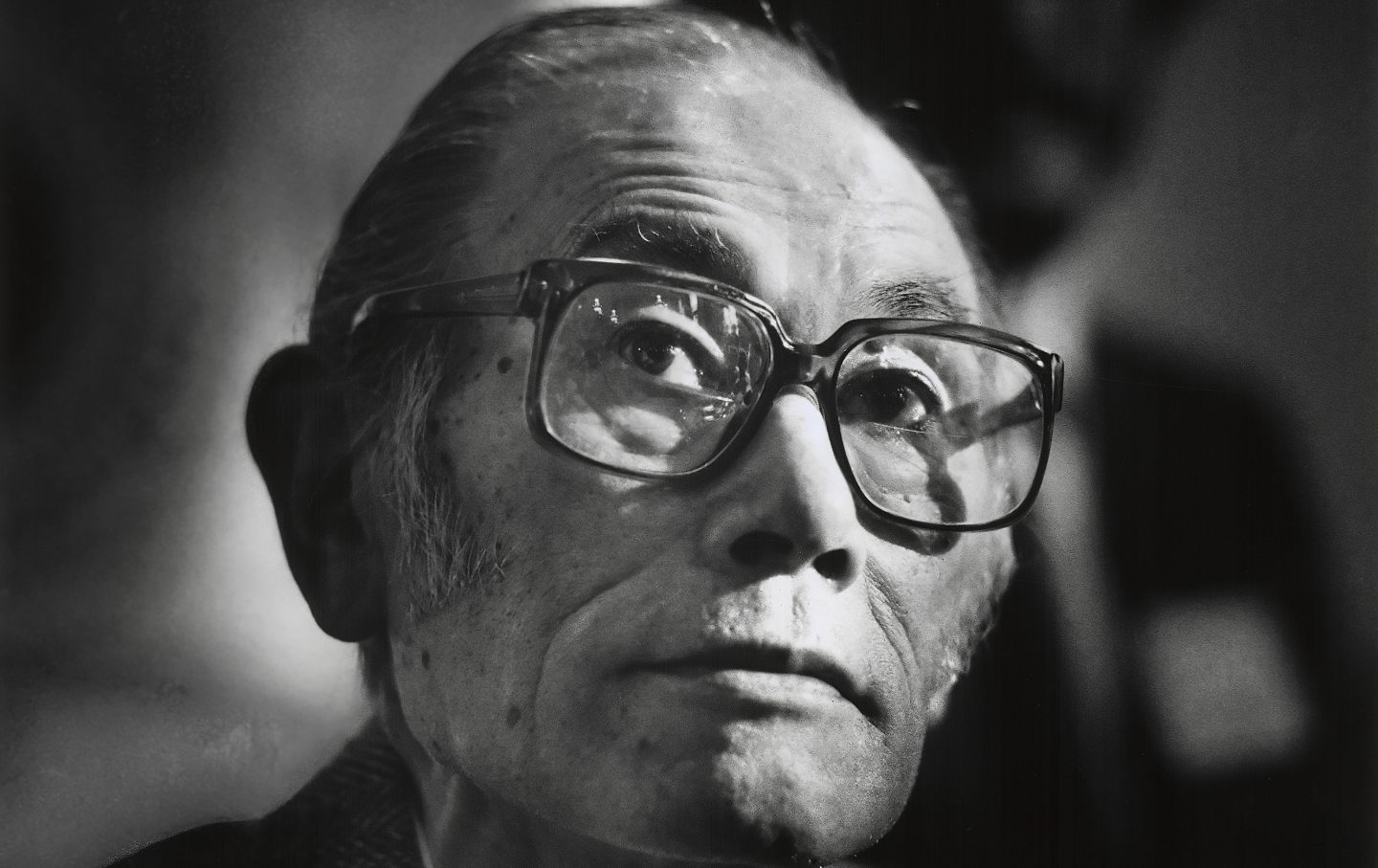End the Persecution of Julian Assange
The fifth anniversary of Assange’s imprisonment would be a good day for the Biden administration to end this sordid saga—before it ends the First Amendment.

Five years ago today, April 11, 2019, London’s Metropolitan Police entered the Ecuadorian embassy in London to arrest WikiLeaks founder Julian Assange. For seven years, Assange had lived inside the embassy. The left-wing administration of Rafael Correa had granted the journalist political asylum. Although the initial extradition request came from Sweden, which claimed that it needed to question Assange over allegations of sexual assault, he feared that the United States would prosecute him for journalistic activities. Ecuador found Assange’s concerns plausible.
Assange requested that Sweden provide assurances that it would not extradite him to the United States—a principle known in international law as “non-refoulement.” According to the former UN special rapporteur on torture Nils Melzer, “In the world of diplomatic relations, the fact that Stockholm refused to issue a non-refoulement guarantee to Assange spoke a clear language and left no room for misunderstandings.”
Instead of allowing Assange safe passage, British police spent millions of pounds surrounding the embassy. If the WikiLeaks founder left, the United Kingdom planned to arrest him. It even pressured Sweden not to withdraw the extradition request or interview Assange in the embassy. And when Sweden did close the investigation without charging Assange, the UK, at the request of the Trump White House, brought its own charges against Assange for jumping bail. Assange was trapped.
Correa’s successor Lenin Moreno sought closer ties with the US and lurched to the right. He revoked Assange’s asylum and invited police into Ecuador’s sovereign embassy. As press gathered outside, police hauled Assange out of the embassy that had been his involuntary home. The WikiLeaks publisher, clearly in ill health, held up a copy of Gore Vidal’s History of the National Security State. As police forced the journalist into a van, he told onlookers that the “UK must resist.”
Officially, British police were arresting Assange for the misdemeanor offense of jumping bail. But the extraordinary spectacle of their entering an embassy to seize a journalist was not the outgrowth of an overzealous approach to misdemeanors. That same day, the United States unsealed an indictment against Assange. Assange was then “further arrested” in relation to a US extradition request. A month later, the Trump administration would expand the indictment, bringing even more charges against Assange. It was precisely what Assange feared when he sought refuge in the embassy.
Assange currently faces 18 felony counts—carrying a potential total of 175 years in prison: one count of conspiring to violate the Computer Fraud and Abuse Act and 17 counts of violating the Espionage Act. All the charges stem from his receiving and publishing classified documents given to Wikileaks by whistleblower Chelsea Manning.
This massive cache of secrets gave the world an unprecedented look at US foreign policy, including its wars in Iraq and Afghanistan. The documents exposed war crimes, human rights violations, and abuses of power. They also showed how the United States seeks to evade accountability for its crimes. In Spain, it tried to pressure the judiciary into dropping an investigation into the killing of a Spanish journalist by US soldiers in Iraq. In Italy, it attempted to pressure the judiciary into dropping a prosecution of CIA agents for “renditions”—i.e., kidnapping.
While the United States demands impunity for its own crimes, it is merciless toward those who expose them. This is evidenced by the US government’s response to these revelations. Whistleblower Manning was held in pretrial conditions that likely constituted torture and then sentenced to 35 years in prison (Obama commuted her sentence after Manning spent six years in prison).
With its arrest of Assange, the US government showed that it was no longer satisfied with merely prosecuting whistleblowers. It was now coming for journalists.
Meet the New Boss
Every major civil liberties, press freedom, and human rights group is urging the US to drop the charges. The mainstream papers who worked with Wikileaks—including The New York Times and The Guardian—have similarly expressed alarm. A growing number of members of Congress in both parties have also called for the charges to be dropped on press freedom grounds. The United Nations special rapporteur on freedom of opinion and expression, Irene Khan, called on the US to end the prosecution.
The US’s legal case marks the first time the Espionage Act has been used against a journalist or publisher. Whistleblowers from Daniel Ellsberg to Edward Snowden have been charged under the Espionage Act. But while past administrations had threatened the press under the act, in practice there remained a red line no one was willing to cross.
The Obama administration waged a vicious war on whistleblowers. It normalized the use of the Espionage Act against journalists’ sources. And it encouraged other countries to prosecute Assange. But it resisted pressure from the FBI and the CIA to bring charges against Assange. This was not out of a love for WikiLeaks. Instead, it was because of the New York Times problem. Any legal precedent set by prosecuting Assange would create a precedent allowing the prosecution of The New York Times or other more mainstream outlets. Obama simply wasn’t willing to potentially criminalize national security reporting just to get Assange.
The Trump administration did not share these concerns. When WikiLeaks published secret CIA hacking tools, Trump’s CIA was enraged to the point that the agency plotted to kidnap or kill Assange. Trump’s Department of Justice dusted off the case against Assange for publishing the Manning revelations.
Trump’s antipathy toward press freedom was clear. But Biden has been president for over two years now and his administration has sought to continue the extradition, even going so far as to appeal adverse rulings.
Popular
“swipe left below to view more authors”Swipe →Criminalizing Investigative Journalism
In spite of the global outcry, the US and UK continue to barrel ahead with the extradition and ultimate prosecution. In 2021, British Judge Vanessa Baraitser rejected the US’s extradition on grounds that it was oppressive. While that was a victory for Assange, Baraitser also rejected all of his press freedom claims. Instead of walking away, Washington appealed this decision. The original ruling was thrown out; Assange’s appeal rights were denied, and his extradition was ordered. Far from closing the legal saga, it opened a second act. His lawyers were now able to appeal Baraitser‘s rejection of their press freedom arguments
In February, for the first time in four years, UK judges were forced to confront the concerns about press freedom that have animated global outrage. For two days before the UK High Court, Assange’s legal team argued that he was a journalist being persecuted for exposing state criminality. Although an iron cage was present in the courtroom for Assange to sit in, he was too sick to attend the proceedings.
In addition to relying on technical legal arguments, British prosecutors argued that Assange was not a journalist. Their arguments were heavily based on declarations from the US prosecutors. As a result, their comments can be considered a preview of what the US government might say if Assange ever reaches US shores.
According to US and UK prosecutors, because WikiLeaks solicited others to “steal” national defense information or commit hacking, Assange is not a journalist. In other words, the mere existence of WikiLeaks as site that publishes leaked information constituted solicitation. Thus, if journalists announce their willingness to publish secrets that are in the public interest, they are soliciting criminal conduct. Not only does the US case against Assange seek to criminalize simple publishing of secrets—if accepted, those claims would transform bold journalism into a criminal conspiracy.
In March, the High Court rejected the bulk of Assange’s arguments. In a 66-page ruling, UK judges explicitly rejected the idea that the charges against Assange violated his right to free expression. Yet they also granted Assange a temporary reprieve in order to file limited appeals based on concerns that the US government may try to argue that he doesn’t have First Amendment rights as a foreign national and the lack of assurances that the US won’t seek the death penalty (none of the current charges carry the death penalty, but there are concerns new capital charges could be filed). Disturbingly, the judges stated that the US could avoid an appeal altogether if it offered assurances based on these concerns.
While Assange has yet to stand trial in the United States, he has now spent five years confined in His Majesty’s Prison Belmarsh—a high security prison reserved for those who pose a threat to public order or national security. Assange’s health continues to deteriorate. He suffered a ministroke in October 2021 and, more recently, broken ribs due to a persistent cough.
At the same time that people around the globe are condemning the persecution of Assange, the Biden administration has made hypocritical pronouncements about its support for press freedom. Biden can’t have it both ways.
Seeking to punish a journalist for publications that were clearly in the public interest is a grave affront to press freedom. WikiLeaks’ role in exposing state criminality should be lauded, not prosecuted. But whatever your views about Assange’s particular brand of journalism, if he is put on trial in the United States, the First Amendment will also be in the dock. After five years, it is time for the Biden administration to end this sordid saga—before it ends the First Amendment.
Independent journalism relies on your support
With a hostile incoming administration, a massive infrastructure of courts and judges waiting to turn “freedom of speech” into a nostalgic memory, and legacy newsrooms rapidly abandoning their responsibility to produce accurate, fact-based reporting, independent media has its work cut out for itself.
At The Nation, we’re steeling ourselves for an uphill battle as we fight to uphold truth, transparency, and intellectual freedom—and we can’t do it alone.
This month, every gift The Nation receives through December 31 will be doubled, up to $75,000. If we hit the full match, we start 2025 with $150,000 in the bank to fund political commentary and analysis, deep-diving reporting, incisive media criticism, and the team that makes it all possible.
As other news organizations muffle their dissent or soften their approach, The Nation remains dedicated to speaking truth to power, engaging in patriotic dissent, and empowering our readers to fight for justice and equality. As an independent publication, we’re not beholden to stakeholders, corporate investors, or government influence. Our allegiance is to facts and transparency, to honoring our abolitionist roots, to the principles of justice and equality—and to you, our readers.
In the weeks and months ahead, the work of free and independent journalists will matter more than ever before. People will need access to accurate reporting, critical analysis, and deepened understanding of the issues they care about, from climate change and immigration to reproductive justice and political authoritarianism.
By standing with The Nation now, you’re investing not just in independent journalism grounded in truth, but also in the possibilities that truth will create.
The possibility of a galvanized public. Of a more just society. Of meaningful change, and a more radical, liberated tomorrow.
In solidarity and in action,
The Editors, The Nation
More from The Nation

A Close Reading of Luigi Mangione’s Self-Help Library A Close Reading of Luigi Mangione’s Self-Help Library
A look at the UnitedHealthcare CEO shooter’s social media accounts points to what Americans are inclined to turn to when their government fails to give them sufficient options.

Red Tape Saves Lives Red Tape Saves Lives
“Government” might sound ineffective and wasteful in the abstract. But Americans will miss it when it’s gone.

One of the Supreme Court’s Most Infamous Cases Is As Relevant as Ever One of the Supreme Court’s Most Infamous Cases Is As Relevant as Ever
Eighty years ago, Korematsu v. United States upheld the incarceration of Japanese Americans. The racism and hysteria that fueled that decision are still with us today.

How Sunday Morning News Shows Promote an Anti-Palestinian Agenda for Washington How Sunday Morning News Shows Promote an Anti-Palestinian Agenda for Washington
Since October 2023, NBC’s Meet the Press, ABC’s This Week, and CNN’s State of the Union have not featured a single Palestinian guest.

RFK Jr. Is Giving Infectious Diseases a Promotional Tour RFK Jr. Is Giving Infectious Diseases a Promotional Tour
We nearly eradicated polio with a vaccine in the 1950’s. But the probable new leader of the HHS has plans that will bring back such life-threatening illnesses.



